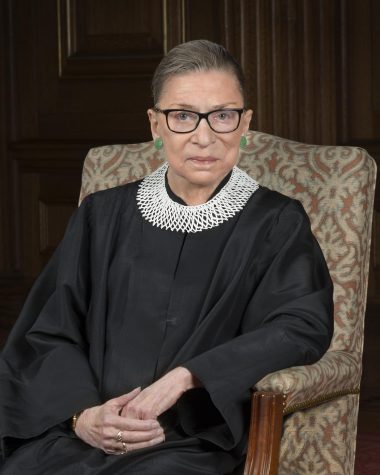Editorial: Remembering Associate Justice Ruth Bader Ginsburg’s Impact on History
September 22, 2020

Who was Justice Ginsburg and what were her significant contributions that helped create the United States as it is today?
To be honest, I didn’t know much about Justice Ginsburg, until recently. I was not aware of her story, the impact she had on the way society is today or the ripple effect of her life and its impact on me.
If Justice Ginsburg was not fighting for equality, the U.S. would be very different. Many people from different walks of life were helped by her firm beliefs of equality for all.
Justice Ginsburg passed away on Sept. 18, 2020. Following her death, my social media account blew up with posts honoring her life and mission. It was clear to me at this point this woman must have had a great impact, if so many people were passionate about expressing their gratitude for what she had done.
The seed was planted: I knew I needed to learn more about Justice Ginsburg’s story and all the accomplishments she had in life.
According to The Supreme Court of the United States Justice Ginsburg was born on March 15, 1933. She married Martin Ginsburg at the age of 21 and they eventually had two children; Jane and James. As a wife and a mother, Justice Ginsburg attended Harvard Law and Columbia Law to earn her law degree.
Justice Ginsburg was appointed in 1993 by former President Bill Clinton, only the second woman and the first Jewish woman to hold a seat on the U.S. Supreme Court. She was well known for her impact on equal rights and her advocacy for women’s rights.
Justice Ginsburg has a long list of major accomplishments following her time in law school, leading up to serving on the Supreme Court. Especially when one considers the culture and times.
My interest peaked when I found the documentary “RBG” on Amazon Prime Video, which portrayed many interesting turns in her life journey. I admire her hard work and dedication, coming from a family of immigrants and working her way up in life.
Both Justice Ginsburg and her husband died from cancer. But the whole time Justice Ginsburg went through treatment, she did not stop working toward social justice and advocating equal rights. Sometimes, she had to be reminded to stop and focus on her cancer treatment.
Additionally, Justice Ginsburg fought through the roadblocks of women having equal opportunities. This became one of her personal missions and through perseverance, she was able to help change the laws and our culture.
She voted with her conscience and always stood up for what she believed in regardless of what other people thought about her political affiliation. If she made a mistake, Justice Ginsburg willingly admitted it to the public rather than covering it up or hiding it. These qualities are why she was so well respected by people and are sometimes forgotten by politicians today.
According to Academy of Achievement, in Weinberger v. Weisenfeld, she fought for a widower male’s right to gain social security for his children. In Ledbetter v. Goodyear Tire, she fought for a female who was being paid less than a male colleague.
But most importantly, Justice Ginsburg always saw people as human beings first, especially through her great friendship with former Associate Justice Antonin Scalia. Often times, Justice Ginsburg and Justice Scalia were on different sides politically in various issues, they viewed each other as individuals and respected each other’s political views. Isn’t that what society needs more of these days?
I personally did not agree with every political view portrayed in the documentary. However, I believe she deserves more credit for her accomplishments and her impact on history. America will miss Justice Ginsburg’s presence but will feel her legacy for years to come.












